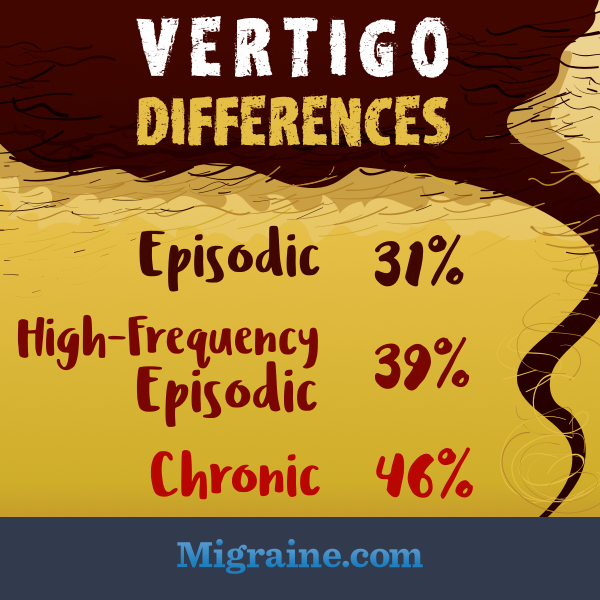Vertigo
Reviewed by: HU Medical Review Board | Last reviewed: December 2019 | Last updated: May 2023
Vertigo or dizziness can be one of the many symptoms of migraine. Vertigo can make people feel like they are spinning, dizzy, off-balance, or moving when standing or sitting still. Sometimes migraine-related vertigo will also cause nausea and vomiting. It may come without head pain. When vertigo occurs during a migraine, it is called migrainous vertigo or vestibular migraine.1
What is vertigo?
Migraine is responsible for more cases of vertigo than any other medical condition. About 30 to 50 percent of people living with migraine experience vertigo.1 The dizziness or vertigo may vary in length and intensity, lasting from a few minutes to up to 3 days.1
Vertigo can happen without any trigger. Some people with migraine find that moving their head or seeing an object moving will trigger an attack.1
In the 2017 In America survey, over 4,500 people with migraine shared their symptoms and how often those happen. People with chronic migraine reported vertigo more often than people with high-frequency episodic or episodic migraine.
Symptoms of migraine with vertigo
- Imbalance
- Dizzy spells
- Sense of spinning, whirling, tilting, rocking, falling or motion
- Sensitivity to motion, especially head movement
- Motion sickness
- Nausea
- Vomiting
- Lightheaded feeling
- Pressure or stuffiness in ears
When vertigo is severe, it can cause problems with standing or walking.
Why does vertigo occur with migraine?
Doctors do not know how migraine and vertigo are connected. How the inner ear works may be changed during a migraine attack, and the inner ear controls balance. Or, how the eye and brain process light and images may cause visual changes that cause dizziness. Another theory is that changes in electrical charges in brain cells cause pain and vertigo.2 Because vertigo and motion sickness are similar, it may be hard to tell which you have. If the nausea and dizziness get better or goes away when you stop moving, then you have motion sickness. If the spinning continues even when you are still, then it is vertigo.
If you have vertigo with other symptoms such as sudden hearing loss, weakness, buzzing in the ear, or fullness in the ear, call your doctor. If the vertigo gets worse, call your doctor as well.
People with migraine can experience vertigo before, during or after a migraine.
How is vertigo treated?
To treat vestibular migraine, often times the vertigo responds to general migraine prevention and treatment. In order to reduce the frequency of migraine attacks, drugs may be prescribed. Some people find some relief with a combination of exercise, drugs, lifestyle changes, and vestibular physical therapy.1
Vestibular physical therapy is an exercise-based treatment that helps to improve balance and reduce dizziness.3 Talk with a migraine specialist about your vertigo so they can work with you to find a treatment that works.
Tracking your migraine symptoms
Keeping a record of your migraine symptoms may help you figure out patterns and triggers to your attacks. It may be helpful to record such things as:
- When and where your pain or symptoms start
- Whether the pain spreads to your entire head or neck
- How well and how quickly acute treatment helps reduce the pain or other symptoms
- How long your pain or symptoms last
- Whether you experience other symptoms such as vision changes, nausea, or light sensitivity
Community experiences of migraine and vertigo
Migraine.com advocates often write about their experiences with vertigo and vestibular migraine. For instance, advocates talk about the importance of support when dealing with vertigo at work. People with migraine and vertigo also have to face the perception and stigma of why they may look dizzy or off-balanced. Others discuss how vestibular migraine and anxiety may linked. For many living with migraine, the frequency and type of symptoms can vary and be unpredicatable, leading to ever changing and new symptoms including vertigo. If you feel any new symptoms, tell your doctor, since it may not be related to migraine.
